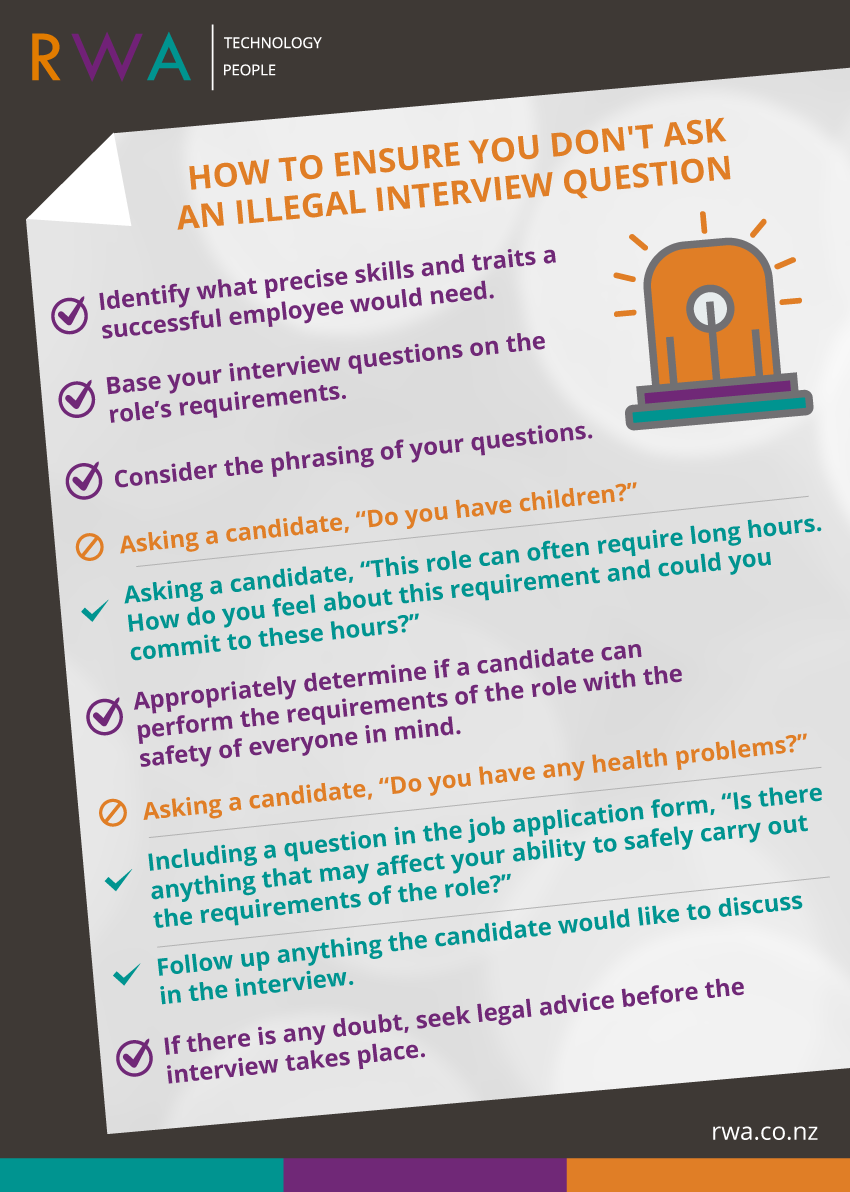 When interviewing candidates, there are clear legal lines you simply cannot cross. However, some interviewers aren’t aware that even innocent ice breaker questions can land them in hot water.
When interviewing candidates, there are clear legal lines you simply cannot cross. However, some interviewers aren’t aware that even innocent ice breaker questions can land them in hot water.
Here are four common, yet illegal, job interview questions you should pay particular attention to.
1. “Where are you from?”
As an interviewer, you may be tempted to innocently ask where a candidate is from. Whilst it might seem like a great question to break the ice, asking this during an interview is actually illegal under the Human Rights Act 1993. This Act prohibits any type of direct or indirect discrimination against an applicant’s race, colour, descent or national or ethnic origin. This question is prohibited because, whether you intend to use the answer or not, it could influence your hiring decision.
2. “Is English your first language?”
Some roles require fluency in certain languages, however, it’s not an employer’s lawful right to know whether a language is a candidate’s native language. This is because the answer provided could tell you the candidate’s nationality, which could in turn influence your hiring decision. If you have doubts about a candidate’s fluency in certain languages and this is a requirement of the role, then it’s a good idea to use a skills assessment instead.
3. “How long have you been working?”
Although this question would seem like it belongs in a list of standard interview questions, asking a candidate this could land you in trouble. Even if the candidate chooses to include their date of birth on their CV, it’s illegal to directly ask them how old they are. This includes questions which could allow you to guess their age. However, you can ask specific questions around how long they’ve been working in a particular job role or industry, as long as it’s relevant to your vacancy.
4. “Do you have any health problems?”
Asking candidates questions around health or disabilities is something that employers need to be extremely cautious around. Within the IT sector, the only scenario where these types of questions are deemed appropriate is when they are related to potential health and safety risks associated with the job or the industry. Be sure to explain why you have to ask this question in relation to the position they’re applying for. If in doubt seek legal advice prior to the interview.
Legally Obtaining Personal Information
A lack of clarity on what information should be asked and how questions ought to be phrased can lead to interviewers unintentionally asking illegal questions. An important step towards avoiding this is to ensure everyone involved in the interviewing process is on the same page. Our best practices are outlined below:

Summary
Aside from avoiding legal issues, identifying what the exact requirements for the role are can help ensure that you don’t miss out on great talent. Passing these requirements down to everyone who is involved within your hiring processes will help keep them all on the same page regarding what they can and cannot ask during an interview. After all, you wouldn’t want to lose great talent over someone asking the wrong, or even illegal questions in an interview.
For more industry insight and news, follow us on LinkedIn.
The contents of this article are not intended as legal advice, please refer to the New Zealand Human Rights Commission’s pre-employment guide for further clarification.

